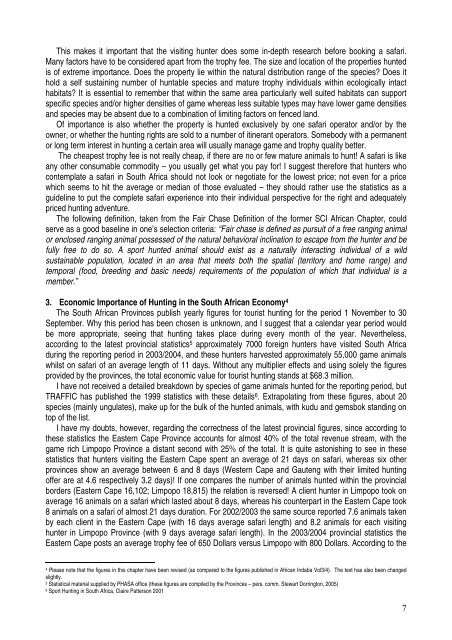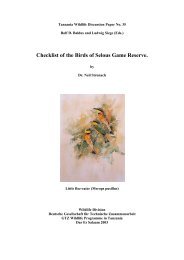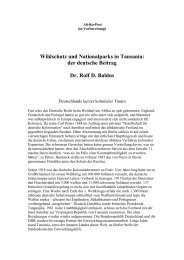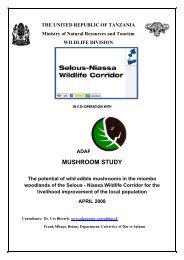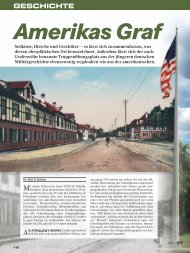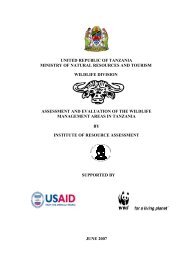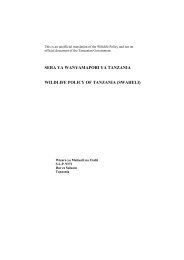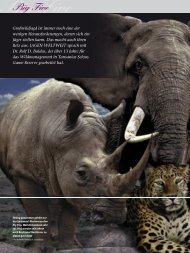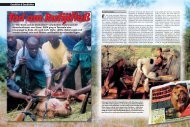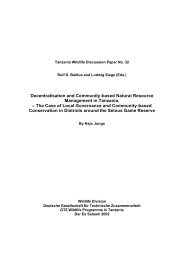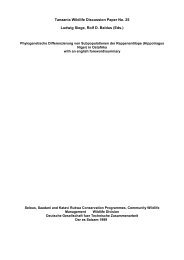African Indaba Articles - wildlife-baldus.com
African Indaba Articles - wildlife-baldus.com
African Indaba Articles - wildlife-baldus.com
Create successful ePaper yourself
Turn your PDF publications into a flip-book with our unique Google optimized e-Paper software.
This makes it important that the visiting hunter does some in-depth research before booking a safari.Many factors have to be considered apart from the trophy fee. The size and location of the properties huntedis of extreme importance. Does the property lie within the natural distribution range of the species? Does ithold a self sustaining number of huntable species and mature trophy individuals within ecologically intacthabitats? It is essential to remember that within the same area particularly well suited habitats can supportspecific species and/or higher densities of game whereas less suitable types may have lower game densitiesand species may be absent due to a <strong>com</strong>bination of limiting factors on fenced land.Of importance is also whether the property is hunted exclusively by one safari operator and/or by theowner, or whether the hunting rights are sold to a number of itinerant operators. Somebody with a permanentor long term interest in hunting a certain area will usually manage game and trophy quality better.The cheapest trophy fee is not really cheap, if there are no or few mature animals to hunt! A safari is likeany other consumable <strong>com</strong>modity – you usually get what you pay for! I suggest therefore that hunters whocontemplate a safari in South Africa should not look or negotiate for the lowest price; not even for a pricewhich seems to hit the average or median of those evaluated – they should rather use the statistics as aguideline to put the <strong>com</strong>plete safari experience into their individual perspective for the right and adequatelypriced hunting adventure.The following definition, taken from the Fair Chase Definition of the former SCI <strong>African</strong> Chapter, couldserve as a good baseline in one’s selection criteria: “Fair chase is defined as pursuit of a free ranging animalor enclosed ranging animal possessed of the natural behavioral inclination to escape from the hunter and befully free to do so. A sport hunted animal should exist as a naturally interacting individual of a wildsustainable population, located in an area that meets both the spatial (territory and home range) andtemporal (food, breeding and basic needs) requirements of the population of which that individual is amember.”3. Economic Importance of Hunting in the South <strong>African</strong> Economy 4The South <strong>African</strong> Provinces publish yearly figures for tourist hunting for the period 1 November to 30September. Why this period has been chosen is unknown, and I suggest that a calendar year period wouldbe more appropriate, seeing that hunting takes place during every month of the year. Nevertheless,according to the latest provincial statistics 5 approximately 7000 foreign hunters have visited South Africaduring the reporting period in 2003/2004, and these hunters harvested approximately 55,000 game animalswhilst on safari of an average length of 11 days. Without any multiplier effects and using solely the figuresprovided by the provinces, the total economic value for tourist hunting stands at $68.3 million.I have not received a detailed breakdown by species of game animals hunted for the reporting period, butTRAFFIC has published the 1999 statistics with these details 6 . Extrapolating from these figures, about 20species (mainly ungulates), make up for the bulk of the hunted animals, with kudu and gemsbok standing ontop of the list.I have my doubts, however, regarding the correctness of the latest provincial figures, since according tothese statistics the Eastern Cape Province accounts for almost 40% of the total revenue stream, with thegame rich Limpopo Province a distant second with 25% of the total. It is quite astonishing to see in thesestatistics that hunters visiting the Eastern Cape spent an average of 21 days on safari, whereas six otherprovinces show an average between 6 and 8 days (Western Cape and Gauteng with their limited huntingoffer are at 4.6 respectively 3.2 days)! If one <strong>com</strong>pares the number of animals hunted within the provincialborders (Eastern Cape 16,102; Limpopo 18,815) the relation is reversed! A client hunter in Limpopo took onaverage 16 animals on a safari which lasted about 8 days, whereas his counterpart in the Eastern Cape took8 animals on a safari of almost 21 days duration. For 2002/2003 the same source reported 7.6 animals takenby each client in the Eastern Cape (with 16 days average safari length) and 8.2 animals for each visitinghunter in Limpopo Province (with 9 days average safari length). In the 2003/2004 provincial statistics theEastern Cape posts an average trophy fee of 650 Dollars versus Limpopo with 800 Dollars. According to the4 Please note that the figures in this chapter have been revised (as <strong>com</strong>pared to the figures published in <strong>African</strong> <strong>Indaba</strong> Vol3/4). The text has also been changedslightly.5 Statistical material supplied by PHASA office (these figures are <strong>com</strong>piled by the Provinces – pers. <strong>com</strong>m. Stewart Dorrington, 2005)6 Sport Hunting in South Africa, Claire Patterson 20017


